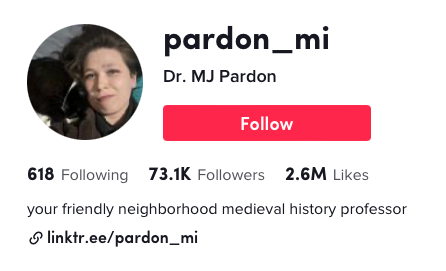A Medievalist's Adventures in TikTok

Dr. Mireille Pardon, 2022–2023 Mellon Faculty Fellow at the Medieval Institute and Assistant Professor of History at Berea College, has another line on her CV that you might not expect: TikTok star. Professor Pardon created a TikTok channel in 2020 as a way to connect with others during the pandemic, and in the past few years her short-form videos, which range from debunking common myths about medieval history to revealing the often humorous realities of academic life, have been garnering tens of thousands of views.
We sat down with Prof. Pardon to learn more about her experience with this exciting and non-traditional way of educating the public about the medieval era.
What inspired you to start a Medieval-themed TikTok channel?
Funnily enough, I actually didn’t initially intend to make a medieval-themed TikTok channel. In fall 2020, I left my close-knit graduate student community at Yale to start my first academic job in Berea College’s history department. The transition from graduate student to faculty member is likely always hard, but combined with moving to a new state in the middle of a pandemic, this was a challenging time for me.
Like many others, I turned to TikTok as a creative outlet that allowed me to interact with people online. There is an immediacy and intimacy to engaging with people on TikTok because you are directly talking into your phone. Watching other peoples’ videos doesn’t always feel so different from watching a friend tell you a story over video chat. Especially in the beginning of the pandemic, I think this has a lot to do with why TikTok grew in popularity so quickly.
I didn’t directly intend to make an educational TikTok account, but I was a newly minted assistant professor teaching a 3-3 load of all new courses. Medieval history (and particularly, how to approach medieval history with students who are interested but don’t have a lot of prior knowledge) was very much on my mind. TikTok also allowed me to “test out” explanations of historical phenomena and jokes about my class’s content with an anonymous audience before I used them on my students.
How did your channel begin to take off?
My first “hit” video came at the end of January 2021. There was a trend going around at the time where people would film themselves running away when faced with a very minor challenge or something that they brought upon themselves while the song Halo by Beyonce played. I made a video of me screaming, pushing all the books off my desk, and running out of the room while the words “realizing I also have to do all the reading I assigned to my students” appeared on the screen. This video went semi-viral and has been viewed over 100,000 times. Even now, with 73,000 followers, very few of my videos get that many views. It’s a bit embarrassing that that was my first hit video because the joke is quite silly and I think I have made many more interesting videos since. However, I think of my TikTok as being about demystifying life in academia as much as it is about creating educational content about medieval history, so perhaps that video served a purpose in that sense.

Having a few early videos go big brought traffic to my channel, but it’s mostly grown slowly and steadily over the past couple years. A lot of my early growth came from correcting misconceptions about the Middle Ages, from torture devices to marriage ages. My most-viewed video has been seen over 1.3 million times and was a response to a video that was circulating widely at the time and asserted incorrectly that most medieval women got married and had children around age 13. In many times and places, the average age of marriage for women was much higher! Especially in the part of the world I specialize in (late medieval Flanders).
Though I love seeing people outside of academia producing history content on TikTok (and it is often well-researched and nuanced!), there are unfortunately a lot of very popular accounts that rehash easily-debunkable myths.
This is all to say, it is a bit unfortunate, but a lot of my growth on TikTok has come from telling other people that they are wrong and trying to direct people to more reputable sources for learning about medieval Europe. I have seen (and felt compelled to respond to!) videos that went viral saying the Middle Ages was a time “before there were judges, juries, or evidence,” the prosecution of witchcraft was solely an effort to suppress the female brewing industry, and the Roman Empire did not exist (it was apparently a myth largely perpetuated by the Spanish Inquisition . . . somehow).
Are there any of your TikTok videos that you are particularly proud of?
I enjoy making videos that meld educational content with modern pop culture. For example, I’ve made videos about why different medieval theologians would have gotten canceled on Twitter and where I would take someone on a first date based on their favorite medieval monastic order. I am also quite fond of a series of skits I did where a time-traveling legal advisor gives people advice on a variety of topics in fifteenth-century Flanders (my research is on fifteenth-century judicial practice, particularly in relation to homicide cases). In these videos, I think I found a creative way to teach people about the medieval past (or at least, inspire people to read more about the Middle Ages so they can understand the jokes!). I’m not sure that I think that TikTok is a very good place to learn about history, but I do think that it is a good place to spark people’s interest and encourage them to pursue these topics in further depth.
Have there been any ways in which creating public humanities content has influenced your approach to your scholarship?
I’m not sure creating public humanities content has had a large influence on my scholarship (or, at least, not yet!), but it has definitely had an impact on my teaching. TikTok is a great test audience for things because the demographics are similar to the age range you meet in the classroom. I think being on TikTok allows me to test the temperature on what assumptions people have about my field of study and what concepts they find most confusing. My students are not always so eager to say when they don’t understand something or need more background information but anonymous people on the internet are always very eager to point out the flaws in an explanation!
The internet might be a strange place to receive pedagogical training, but I do think it has made me a better teacher. Overall, TikTok is a great test site to figure out what subjects my students might find most compelling, what assumptions they might already have about those subjects, and what ways of approaching those topics will work best.
I have also incorporated making a video essay as an alternative assignment to writing a final paper in one of my classes and I’m not sure I would have done that if I hadn’t been making a lot of videos about history myself.
What have been the biggest surprises about being an academic on TikTok?
The biggest surprise has definitely been that people actually like my videos! No one was more surprised than I was to see my channel grow. In comparison to real influencers, 73,000 people is not a huge following, but I am still in awe of how many people have seen my videos. It dwarfs the number of students I will ever see in the classroom, even across my entire career, and that is a bit daunting.

Surprisingly, TikTok has led to some professional opportunities for me. Being on TikTok has led me to think more intentionally about public history and how academics can better communicate their ideas to a lay audience. I am involved with a couple roundtables at Kalamazoo this year which I co-organized with Lauren Cole, a fellow TikToker and history Ph.D. student at Northwestern.
My colleague Sarah Ifft Decker, a medieval history professor at Rhodes College, hosts a podcast called Media-eval where she talks about how the Middle Ages are portrayed in modern movies, tv, and books. I appeared on her podcast to talk about the film Redbad and in exchange, she appeared as a guest on my TikTok. In her video, she gave three things that she wishes more people knew about Jewish communities in the Middle Ages. I enjoy having guests on my TikTok and that is usually my go-to question for them: “what are three things you wish more people knew about your field of study?”
Anything else you would like to share with our readers?
Despite making a lot of TikTok content over the past two years, I don’t think that TikTok is a good way to learn about history, medieval or otherwise. The format of TikTok encourages sensationalism over nuance and popular misconceptions about the past spread easily on the app. While I hope that my videos may combat that on some level, my main goal is to encourage more people to study the Middle Ages, point them in the direction of better sources, and nurture public interest in my field of study in general. I also hope to demystify life in academia and provide a window into what my life is like for those interested in pursuing a similar career.
You can follow Dr. Pardon on TikTok @pardon_mi.